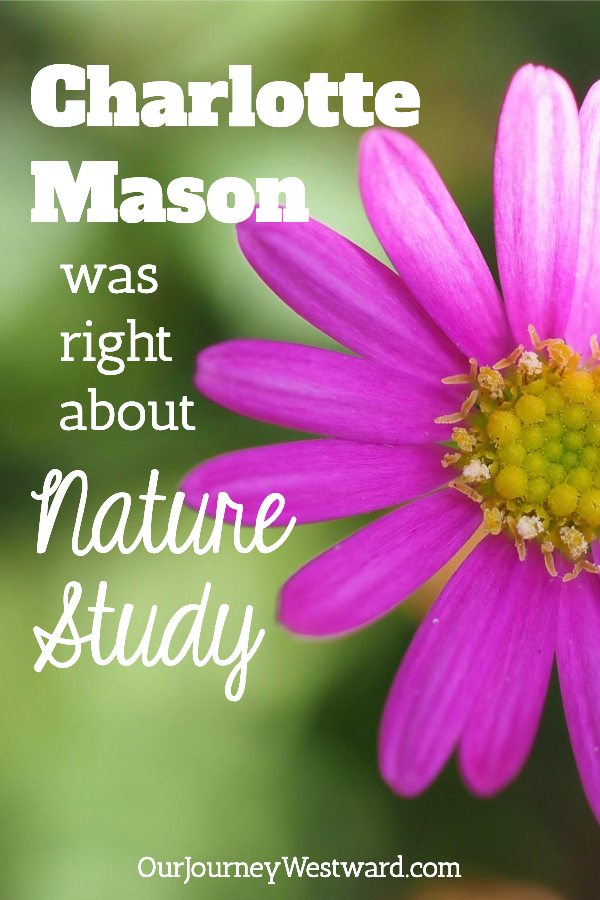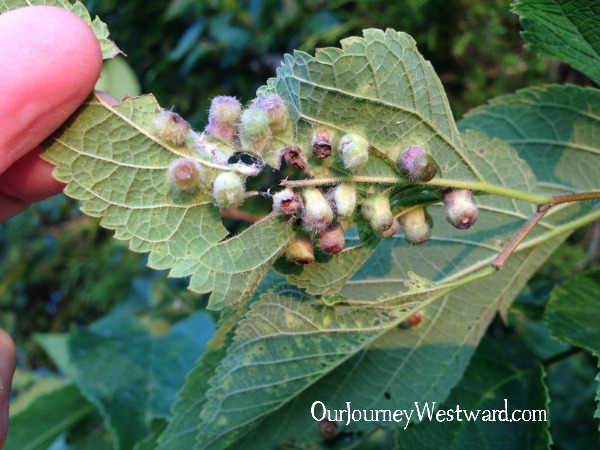Charlotte Mason Was Right About Nature Study
Charlotte Mason was a very wise teacher. I’ve been pondering her thoughts on nature study lately and have to say…she was right! My children are living proof – as are so many children of families who make nature study a priority.

Just what exactly was she right? Oh, so many things. I’ve taken some time to pull together several of her thoughts on nature study that have rung true in our home.
16 Ways Charlotte Mason Was Right About Nature Study

| Eli wanted to know everything about this exoskeleton |
1. Nature study is important.
Nature knowledge is most important for young children. It would be well if we all persons in authority, parents and all who act for parents, could make up our minds that there is no sort of knowledge to be got in these early years so valuable to children as that which they get for themselves of the world they live in. Let them once get touch with nature, and a habit is formed which will be a source of delight through life. We were all meant to be naturalists, each in his degree, and it is inexcusable to live in a world so full of the marvels of plant and animal life and to care for none of these things.
We have developed such a love for learning, being outdoors, and knowing more about our Creator and His creation through nature study.
2. Children are born naturalists, and parents must encourage it.
Children are born naturalists, with a bent inherited, perhaps, from an unknown ancestor; but every child has a natural interest in the living things about him which it is the business of his parents to encourage; for, but few children are equal to holding their own in the face of public opinion; and if they see that the things which interest them are indifferent or disgusting to you, their pleasure in them vanishes, and that chapter in the book of nature is closed to them.
When my husband and I are excited, our children naturally follow. I’ve seen so many parents who are “grossed out” by or afraid of things in nature, and their children begin to believe the same things. Oh, the wonders and beauty they are missing!

| I didn’t know about these hackberry galls while on the trail, but I researched with my children at home later |
3. Mothers and teachers should be knowledgeable about nature.
Mothers and teachers should know about nature. The mother cannot devote herself too much to this kind of reading, not only that she may read tit-bits to her children about matters they have come across, but that she may be able to answer their queries and direct their observations.
I don’t know everything about nature! But I do take time to prepare myself just a bit when I know our walk will focus on something particular. Even if that means we all read a nature book together before (or after) the walk, I relish in their inquisitiveness, and we all find the answers together.
*Just a note: The NaturExplorers series gives parents a fair amount of background information about each topic so mom is prepared for most questions in the field.
4. Many hours outdoors are important.
It is infinitely well worth the mother’s while to take some pains every day to secure, in the first place, that her children spend hours daily amongst rural and natural objects; and in the second place, to infuse into them, or rather, to cherish in them, the love of investigation.
We don’t spend hours outdoors every day now, but we used to when the kiddos were younger. Not all of that time was official nature study, but the inquisitiveness from our nature lessons carried over into playtime. At this point, we have a nature study approximately once per week.

| Serious learning happens during what seems like play |
5. Nature “labs” are essential for learning connections.
The child who learns his science from a text-book, though he go to nature for illustrations, and he who gets his information from object lessons, has no chance of forming relations with things as they are, because his kindly obtrusive teacher makes him believe that to know about things is the same as knowing them personally.
Do children keep tadpoles, and silkworms, and caterpillars in these days? Very few have given us the results of their own observations. We have many capital descriptions from books, and that is better than nothing, but the very essence of natural history is that it should, so far as possible, be drawn direct from nature.
I consider nature study a science lab where we make real connections to actual specimens. Of course, we read about those things, too (when necessary), but experiential knowledge is important for complete understanding.
6. Observation and inquisitiveness are built through playful learning.
This is all play to the children, but the mother is doing invaluable work; she is training their powers of observation and expression, increasing their vocabulary and their range of ideas by giving them the name and the uses of an object at the right moment, when they ask, ‘What is it?’ and ‘What is it for?
Sometimes, our nature walks might seem more like recess—especially in the younger years. So much can be absorbed through playful learning, though! I follow inquisitiveness with explanations, appropriate vocabulary, and excitement.

| Insects and spiders and webs, oh my |
7. Bugs aren’t scary until someone tells you they are.
With regard to the horror which some children show of beetle, spider, worm, that is usually a trick picked up from grown-up people.
Get over your fears, momma. Your babies are so excited to learn – even about the scary stuff.
8. It’s good to visit the same places continually.
Children should be made early intimate with the trees, too; should pick out half a dozen trees, oak, elm, ash, beech, in their winter nakedness, and take these to be their year-long friends.
By visiting the same nature spots season in and season out, children begin to see patterns and internalize truths about nature. Don’t think you have to go somewhere new every week.

| This creek changes with every season and every new weather pattern |
9. Nature journals are important.
As soon as he is able to keep it himself, a nature-diary is a source of delight to a child.
Yes, nature journals have become beloved in our home. We even go back through them years later with fond memories!
10. Nature study builds the habit of patience.
Children should be encouraged to watch, patiently and quietly, until they learn something of the habits and history of bee, ant, wasp, spider, hairy caterpillar, dragon-fly, and whatever of larger growth comes in their way.
Oh, that habit of patience. It always seems to need a little tweaking around our house. Nature study is a great activity for practicing patience, whether waiting for the perfect moment to snap a photo or sitting quietly so the birds will come to the feeder.

| Hands-on, I mean feet-on learning builds understanding |
11. Nature study should begin at an early age.
The sense of beauty comes from early contact with nature.
My littlest man started his nature walk journeys before he could crawl as he tagged along with the rest of us. He has become the best nature detective and has more innate nature knowledge than the others. I’m sure that comes from his early exposure.
12. Nature study is an excellent foundation for the other sciences.
When children are old enough to understand that science itself is in a sense sacred, and demands some sacrifice, all the common information they have been gathering until then, and the habits of observation they have acquired, will form an excellent ground work for a scientific education. In the meantime let them consider the lilies of the field and fowls of the air.
I can honestly tell you that {serious} nature study in the elementary and early middle school years fully prepared my older children for higher-level science courses.

13. Nature study is to be taken seriously.
Surely it is not too much to expect that every boy and girl should, before the age of twelve, have formed a little herbarium of the wild flowers in their own neighbourhood, nicely pressed and mounted, and carefully described.
Nature study is a science course and should be treated with the seriousness of a science course. While it can be playful and is definitely lots of fun, parents should expect a level of learning and performance – especially as children get older.
*I have written several different nature study resources that can perfectly meet your particular family’s needs. The NaturExplorers series digs deep into nature topics with creative walks, hands-on activities, kid-friendly research projects, literature lists, and connections to things like artists, composers, and poetry. 100+ Creative Nature Walks is grab-n-go and provides simple yet creative ideas for nature walks with all ages. The two volumes of 40 Nature Walks: Science Labs On-the-Go include everything you need for learning and journaling on simple, printable nature notebooking pages. The No Sweat Nature Study series is meant to be used around the kitchen table with your entire family and uses unique media to teach nature study. Finally, I can teach nature study to your children online through interactive No Sweat Nature Study LIVE lessons!
14. Nature study gets the wiggles out.
I have seen the young man of fierce passions and uncontrollable daring expend healthily that energy which threatened daily to plunge him into recklessness, if not into sin, upon hunting out and collecting, through rock and bog, snow and tempest, every bird and egg of the neighbouring forest .
Most of us have wiggly kids—at least every now and then. I have very wiggly boys, and nature study is a great way to get those wiggles out while still learning. Active bodies and active minds are both highly encouraged during nature lessons.

| Nature investigation doesn’t have to be in the form of a walk |
15. Nature study creates a lifelong passion for learning.
Let them once get in touch with nature and a habit is formed which will be a source of delight and habit through life.
Inquisitiveness, research, and detailed observation are important parts of nature study. They also happen to be characteristics of children who develop a love for learning (aka a lifestyle of learning). Also, having kids who grow up to love nature for a lifetime is a distinct possibility.
16. Mommas need to plan a little for nature study.
An observant child should be put in the way of things worth observing.
Nature study planning doesn’t have to take a lot of time. However, a little time must be spent ensuring your learning time is worthwhile. Any of these resources can help!
So there you have it—a few of Charlotte Mason’s thoughts that have consistently worked regarding our nature studies over the last nineteen years. They have helped bring our homeschool science studies alive and provided us with a precious love for our Creator and His creation that will last a lifetime.






